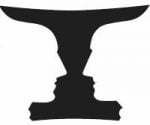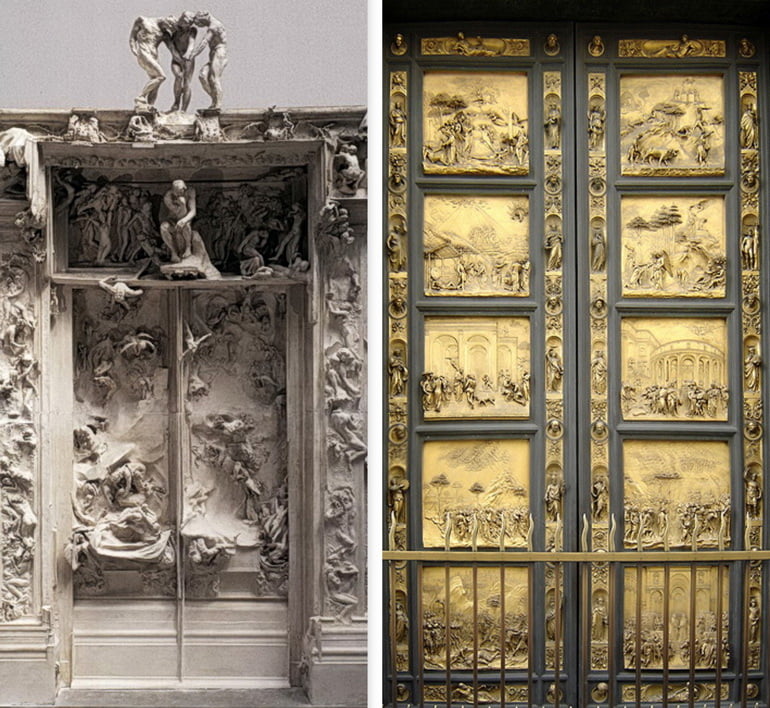A WARRIOR CAME TO THE ZEN MASTER HAKUIN AND ASKED “IS THERE SUCH A THING AS HEAVEN AND HELL?”
HAKUIN SAID “WHO ARE YOU?”
THE WARRIOR REPLIED “I AM CHIEF SAMURAI TO THE EMPEROR.”
HAKUIN SAID “YOU, A SAMURAI? WITH A FACE LIKE THAT, YOU LOOK MORE LIKE A BEGGAR.”
AT THIS THE WARRIOR BECAME SO ANGRY HE DREW HIS SWORD.
STANDING CALMLY IN FRONT OF HIM, HAKUIN SAID “HERE OPEN THE GATES OF HELL.”
PERCEIVING THE MASTER’S COMPOSURE, THE SOLDIER SHEATHED HIS SWORD AND BOWED.
HAKUIN THEN SAID “AND HERE OPEN THE GATES OF HEAVEN.”
Heaven and hell are not geographical. If you go in search of them you will never find them anywhere. They are within you, they are psychological. The mind is heaven, the mind is hell, and the mind has the capacity to become either. But people go on thinking everything is somewhere outside. We always go on looking for everything outside because to be inwards is very difficult. We are outgoing. If somebody says there is a god, we look at the sky. Somewhere, sitting there, will be the divine person.
One psychologist in an American school asked small children what they thought about God. Children have clearer perception: they are less cunning, more truthful. They are more representative of the human mind, they are unperverted. So he asked the children and the answers were collected. The conclusions were very ridiculous. Almost all the children depicted God something like this — an old man, very tall, bearded and very dangerous. He created fear. If you didn’t follow him he would throw you into hell; if you prayed and followed him he would give you paradise and all the pleasures. He was sitting on a throne in the sky watching everybody. You couldn’t escape him; even in your bathroom he was looking.
The outgoing mind projects everything outside. This is YOUR God too. Don’t laugh, don’t think this is a child’s conception — no, this is you.
This is how you think about God — as a cosmic spy, always searching to condemn, to punish, to throw you into hell… as very ferocious, revengeful. That’s why all religions are based on fear. Religions say if you do this you will be appreciated, rewarded; if you don’t do this, you will be punished. The base seems to be fear. God just seems to be a very powerful emperor sitting on a throne in heaven. The whole concept is foolish but human; the human mind is foolish. The whole concept is anthropocentric.
In the Bible it is said God created man in his own image. In reality, it seems to be quite otherwise: man created God in his own image. We have projected God in our own image; he is just a blow-up of the human mind. He is a bigger human mind, that’s all. Remember, if you think God is somewhere outside you, you have not even taken the first step towards being religious.
The same happens with all such concepts. We say heaven is without, hell is without; it is as if there exists nothing within. What is within you? The moment you think of the within it seems that everything goes empty. What is within? The world is without, sex is without, sin is without, virtue is without. God, heaven, hell — everything is without. What is within you? Who are you? The moment you think of the within your mind goes blank, there is nothing.
In reality, everything is within; the outer is just a projection. Fear is within you; it is projected as a hell. Hell is just a projected image on the screen — of the fear that is within you, of the anger, of the jealousy, of all that is poisonous in you, of all that is evil in you. Heaven is, again, a projected image on the screen — of all that is good and beautiful, of all that is blissful within you. The Devil is the fallen human being, God is the risen human being. God is the ultimate possibility of your beatitude; the Devil is your ultimate fall. There is nobody like the Devil existing somewhere. You will never meet him unless you become him. And you will never encounter God unless you become God.
This story is beautiful. The Zen master Hakuin is one of the rare flowerings. A warrior came to him, a samurai, a great soldier, and he asked “Is there any hell, is there any heaven? If there is hell and heaven, where are the gates? Where do I enter from? How can I avoid hell and choose heaven?” He was a simple warrior. Warriors are always simple. A warrior knows only two things, life and death — nothing much. His life is always at stake, he is always gambling; He is a simple man.
This simple warrior came to Hakuin to ask where is heaven and where is hell. He had not come to learn any doctrine. He wanted to know where the gate was so he could avoid hell and enter heaven. And Hakuin replied in a way only a warrior could understand. And what did Hakuin do? He said, “Who are you?” And the warrior replied, “I am a samurai.” It is a thing of much pride to be a samurai in Japan. It means being a perfect warrior, a man who will not hesitate a single moment to give his life. For him, life and death are just a game.
He said, “I am a samurai, I am a leader of samurais. Even the emperor pays respect to me.”
Hakuin laughed and said, ” You, a samurai? You look like a beggar.”
The samurai’s pride was hurt, his ego hammered. He forgot what he had come for. He took out his sword and was just about to kill Hakuin. He forgot that he had come to this master to ask where is the gate of heaven, to ask where is the gate of hell. Then Hakuin laughed and said, “This is the gate of hell. With this sword, this anger, this ego, here opens the gate.” This is what a warrior can understand. Immediately he understood: This is the gate. He put his sword back in its sheath. And Hakuin said, “Here opens the gate of heaven.”
Hell and heaven are within you, both gates are within you. When you are behaving unconsciously there is the gate of hell; when you become alert and conscious, there is the gate of heaven.
What happened to this samurai? When he was just about to kill Hakuin, was he conscious? Was he conscious of what he was about to do? Was he conscious of what he had come for? All consciousness had disappeared. When the ego takes over, you cannot be alert. Ego is the drug, the intoxicant that makes you completely unconscious. You act but the act comes from the unconscious, not from your consciousness. And whenever any act comes from the unconscious, the door of hell is open. Whatsoever you do, if you are not aware of what you are doing the gate of hell opens. Immediately the samurai became alert. Suddenly, when Hakuin said, “This is the gate, you have already opened it –” the very situation must have created alertness.
This is the meaning of the story. Not even a single moment had passed and Hakuin said, “This is the gate of hell. Now the gate of hell opens.” And not a single moment had passed and he said, “Look, this is the gate of heaven.” Heaven and hell are not very distant, they are neighbors; only a small fence divides them. You can jump that fence, even without a gate. You go on jumping from this to that. In the morning you may be in heaven; by evening you are in hell. This moment heaven, that moment hell. It is just an attitude, just a state of your mind, just how you are feeling. Many times, in a single life, you may visit hell, and many times you may visit heaven. In a single day also… One who is incapable of opening the door of hell completely, will be incapable of opening, completely, the door of heaven. Go through hell. The path passes through there; heaven is achieved through hell.
This is the meaning of the anecdote. Hakuin first created hell for the warrior; hell must be created first. Hell is easy to create — you are always ready, always knocking at the door.
You are afraid but always ready; you are not courageous but always ready; you are not daring, but always ready. There is continuous turmoil inside. Hakuin could not have created heaven first; that is impossible, no one is ready. Heaven is very far away; hell is nearby, just around the corner. You move and you are in it.
Your mind is hell. Going beyond your mind is heaven. Go beyond the mind. That is the essence of the whole teaching of all the awakened ones.
Osho, Bodhidharma: The Greatest Zen Master, Ch 11 (excerpt)
मैं समझता हूँ कि है जन्नत ओ दोज़ख़ क्या चीज़
एक है वस्ल तिरा एक है फ़ुर्क़त तेरी ………………जलील मानिकपूरी
maiñ samajhtā huuñ ki hai jannat o dozaḳh kyā chiiz
ek hai vasl tirā ek hai furqat terī …………………..JALEEL MANIKPURI
I do understand what heaven is and what hell is,
one is union with you and the other is the separation from you.
“Swarg yahin, Nark yahan, iske siva jaana kahaan?” — Mera Naam Joker (1970) — Indian romantic drama film, directed, edited and produced by Raj Kapoor under his banner R. K. Films, This immortal song sung by Mukesh, composed by Shankar Jaikishan and written by Shailendra is my all-time favorite song.
(318) Jeena Yahan Marna Yahan | Mera Naam Joker | Raj Kapoor | Mukesh | Shankar Jaikishan – YouTube
Jeena Yahan Marna Yahan, Iske Siva Jaana Kahan
Ji Chahe Jab Humko Awaaz Do
Hum Hain Wahin Hum Thhe Jahan,
Apne Yahin Dono Jahan Iske Siva Jana Kahan
Jeena Yahan ……
Yeh Mera Geet Jeevan Sangeet Kal Bhi Koi Dohrayega
Jag Ko Hasane Bahrupiya
Roop Badal Phir Aayega
Swarg Yahin Nark Yahan Iske Siva Jana Kahan
Jeena Yahan ……
Kal Khel Mein Hum Ho Na Ho Gardish Mein Taare Rahenge Sada
Bhoolenge Hum Bhoologe Tum
Par Hum Tumhare Rahenge Sada
Rahenge Yahin Apne Nishan Iske Siva Jana Kahan
Jeena Yahan …


Awesome
Superb. Thanks
‘Going beyond the mind is heaven.’
Very true.